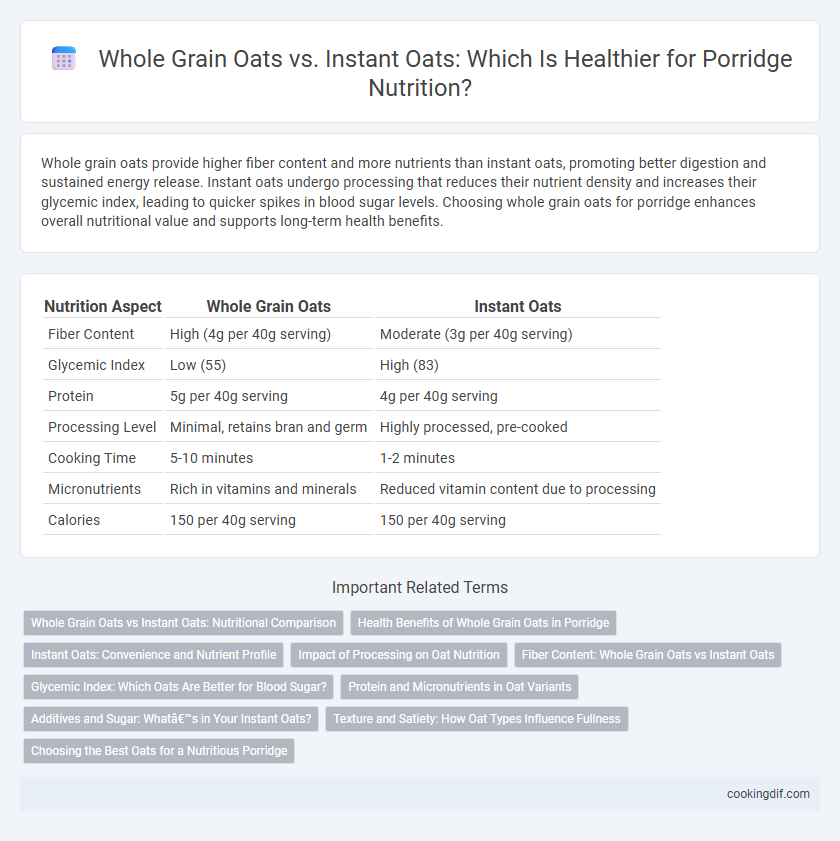Whole grain oats provide higher fiber content and more nutrients than instant oats, promoting better digestion and sustained energy release. Instant oats undergo processing that reduces their nutrient density and increases their glycemic index, leading to quicker spikes in blood sugar levels. Choosing whole grain oats for porridge enhances overall nutritional value and supports long-term health benefits.
Table of Comparison
| Nutrition Aspect | Whole Grain Oats | Instant Oats |
|---|---|---|
| Fiber Content | High (4g per 40g serving) | Moderate (3g per 40g serving) |
| Glycemic Index | Low (55) | High (83) |
| Protein | 5g per 40g serving | 4g per 40g serving |
| Processing Level | Minimal, retains bran and germ | Highly processed, pre-cooked |
| Cooking Time | 5-10 minutes | 1-2 minutes |
| Micronutrients | Rich in vitamins and minerals | Reduced vitamin content due to processing |
| Calories | 150 per 40g serving | 150 per 40g serving |
Whole Grain Oats vs Instant Oats: Nutritional Comparison
Whole grain oats contain higher fiber content, more protein, and essential vitamins like thiamine and magnesium compared to instant oats, which often undergo processing that reduces nutrient density. The minimal processing of whole grain oats preserves beta-glucan, a soluble fiber linked to heart health and improved cholesterol levels, whereas instant oats may have added sugars and sodium to enhance flavor. Choosing whole grain oats supports sustained energy release and better blood sugar regulation in porridge nutrition.
Health Benefits of Whole Grain Oats in Porridge
Whole grain oats in porridge provide higher fiber content, aiding digestion and promoting heart health compared to instant oats. They retain essential nutrients like vitamins, minerals, and antioxidants, which contribute to better blood sugar regulation and sustained energy release. Consuming whole grain oats regularly supports improved cholesterol levels and reduced risk of chronic diseases such as type 2 diabetes.
Instant Oats: Convenience and Nutrient Profile
Instant oats offer unmatched convenience, requiring minimal cooking time while retaining key nutrients such as soluble fiber and essential vitamins like B-complex and iron. Their fine texture allows for quick digestion and absorption, making them ideal for busy lifestyles without compromising basic nutritional benefits. Though slightly lower in fiber compared to whole grain oats, instant oats remain a practical choice for a nutritious, fast breakfast option.
Impact of Processing on Oat Nutrition
Whole grain oats retain the bran, germ, and endosperm, preserving higher fiber, vitamins, and minerals compared to instant oats, which undergo extensive processing. The steaming and rolling of instant oats reduce cooking time but lead to a decrease in soluble fiber content, particularly beta-glucan, which is crucial for heart health and blood sugar regulation. Consequently, whole grain oats provide a more nutrient-dense and slower-digesting option ideal for sustained energy release in porridge.
Fiber Content: Whole Grain Oats vs Instant Oats
Whole grain oats contain significantly higher dietary fiber compared to instant oats, with about 4 grams of fiber per 40-gram serving versus 2 grams in instant oats. The higher fiber content in whole grain oats aids in better digestion, promotes satiety, and helps maintain stable blood sugar levels. Instant oats often undergo processing that reduces their fiber density, making whole grain oats a superior choice for nutrient-rich porridge.
Glycemic Index: Which Oats Are Better for Blood Sugar?
Whole grain oats have a lower glycemic index (GI) of around 55, promoting more stable blood sugar levels compared to instant oats, which have a higher GI of approximately 79 due to their processing. The slower digestion of whole grain oats leads to a gradual glucose release, making them more beneficial for blood sugar management and diabetes control. Choosing whole grain oats over instant oats helps reduce blood sugar spikes and supports sustained energy throughout the day.
Protein and Micronutrients in Oat Variants
Whole grain oats contain higher protein levels, typically around 13-15 grams per 100 grams, compared to instant oats which have about 10-12 grams. They also retain more micronutrients, including magnesium, zinc, and B vitamins, crucial for metabolic and immune functions. Instant oats undergo more processing, resulting in reduced fiber and micronutrient content, impacting overall nutritional value in porridge.
Additives and Sugar: What’s in Your Instant Oats?
Whole grain oats retain their natural fiber and nutrients without added sugars or additives, making them a healthier choice for porridge. Instant oats often contain added sugars, artificial flavors, and preservatives, which can increase calorie content and reduce nutritional value. Checking ingredient labels is essential to avoid hidden additives and maintain a balanced diet.
Texture and Satiety: How Oat Types Influence Fullness
Whole grain oats provide a chewier texture and take longer to digest, promoting prolonged satiety and stable blood sugar levels. Instant oats, processed for quick cooking, have a finer texture and digest faster, often leading to quicker hunger return. Choosing whole grain oats enhances fullness and supports better appetite control in porridge.
Choosing the Best Oats for a Nutritious Porridge
Whole grain oats contain more fiber, vitamins, and minerals compared to instant oats, making them a superior choice for a nutritious porridge. Instant oats are often pre-cooked and processed, which can reduce their nutrient content and increase glycemic index, leading to quicker blood sugar spikes. Selecting steel-cut or rolled whole grain oats maximizes the intake of beta-glucan fiber, essential for heart health and sustained energy release.
Whole grain oats vs instant oats for porridge nutrition Infographic

 cookingdif.com
cookingdif.com